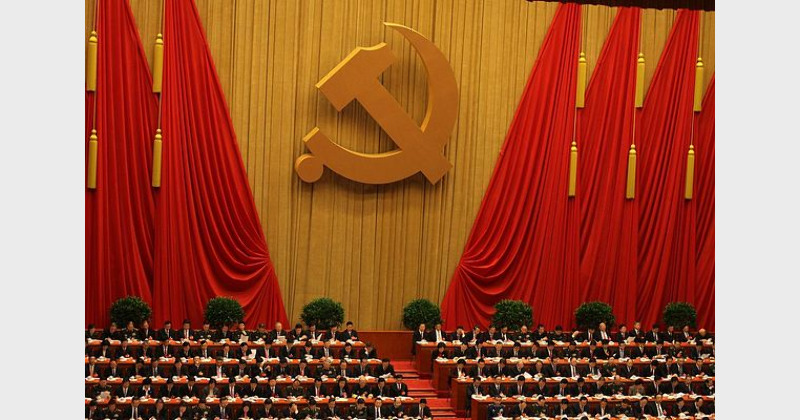BRICS's significant achievements have been in financial cooperation, as evidenced by establishing the New Development Bank (NDB), the Contingent Reserve Arrangement (CRA), and several other financial synchronization instruments. The NDB's pledge to use local currency finance rather than solely relying on the US dollar is the tip of BRICS de-dollarisation initiatives' iceberg.
The BRICS SUMMIT 2022 can subvert the paradigm of global narratives. If the member countries, especially the Brobdingnags -Russia, India and China (RIC)- show cohesion. Many Western analysts portray BRICS as a glorified PR attempt for participating countries. The evolving BRICS cross-border payment mechanisms- an alternative to the SWIFT global banking network may impinge them. To give this some milieu, the share of the US dollar in the Russia–China bilateral trade settlement fell from nearly 90% in 2015 to 46% in 2020 (Reference SimesSimes, 2020).
The BRICS countries are home to 41.5% of the world population. Thus, they have a more significant responsibility to re-establish peace and order. The BRICS Brobdingnags-Russia, India and China–are facing challenges. Russia and China are facing challenges from the western world. But, India is facing hostility from the BRICS member state–China.
For sure divided BRICS, mainly divided RIC suits many but not all the BRICS member countries and the world. Although sorting differences with the western world may take time for Russia and China, prolonging differences among the BRICS member state – China and India can be catastrophic.
Two years into the military standoff along the Line of Actual Control in Ladakh, China and India should take steps to revive bilateral dialogue and set the stage for the BRICS (Brazil-Russia-India-China-South Africa) summit in China later this year. As a host of the BRICS summit, China shouldn't hesitate to take the first step towards the revival of bilateral relations with India. In fact, the Doklam border standoff was solved after two-and-half months, just before the BRICS summit 2017. And Indian Prime Minister attended the BRICS summit in Xiamen in September 2017.
Completing seventy years, the India-China border issue has become one of the most prolonged border disputes of the world. But now, nibbling and open wounds are on the verge of causing cancer on both sides.
For more than 3,000 years, China and India accounted for 50 per cent of the world's economic output. However, then the Industrial Revolution gave North America and Europe 150 golden years. At the beginning of the post covid era, BRICS, especially India-China, was at a historical deflection point, leading to either belle époque or dark age.
यथा चतुर्भिः कनकं परीक्ष्यते निकर्षणछेदनतापताडनैः । तथा चतुर्भिः पुरुषः परीक्ष्यते श्रुतेन शीलेन कुलेन कर्मणा॥
As per the above Sanskrit quote, "Just as the purity of gold is tested by four means, namely, rubbing, cutting, burning and beating. Man or relationship is tested by four means, namely, learning, conduct, pedigree and action." Will India-China act to resolve the dispute or stay oblivious to the changing world–scenario causing further rubbing in the bilateral relationship?
The world, especially western analysts, is busy depicting how many differences BRICS member countries have with each other. The art of propaganda is used to deflect domestic audiences, political opponents and diplomatic compulsions by sensationalizing third world (as per them) countries' differences.
Yet largely devoted to economic issues, the BRICs began to assume a political identity at Yekaterinburg. In their summit statement, the leaders urged for a 'more democratic and just multipolar world order based on the rule of international law, equality, mutual respect, cooperation, coordinated action and collective decision-making of all states'. 2008 summit declaration seems apt and very relevant for today's world.
Further, BRICS leaders called for a "comprehensive reform of the UN" to make it more democratic and efficient. Neither then nor later did Russia and China, the two permanent affiliates of the UN Security Council, ever render this vague support into explicit backing. UN reform is the need of the hour. Russia and China should act to initiate this reform.
The Political economy of De-dollarization
BRICS's significant achievements have been in financial cooperation, as evidenced by establishing the New Development Bank (NDB), the Contingent Reserve Arrangement (CRA), and several other financial synchronization instruments. Despite the breadth of the BRICS countries, financial cooperation is increasing.
The NDB's pledge to use local currency finance rather than solely relying on the US dollar is the tip of BRICS de-dollarisation initiatives' iceberg. The growing tension between the US and Russia-China has accelerated the de-dollarization process. US prolonged confrontation with Russia and China may convert the de-dollarization process from a temporary change to a paradigm shift in global finance. To give this some context, Saudi Arabia is discussing with China to price some of its oil sales to China in yuan. China purchases more than 25% of the oil that Saudi Arabia exports.
Similarly, India is stepping closer to setting up an alternative payments system to maintain its trade with Russia. Further, the share of the US dollar in Russia–China bilateral trade settlement fell from nearly 90% in 2015 to 46% in 2020 (Reference SimesSimes, 2020).
Likewise, Russia and China have launched their cross-border payment mechanisms as alternatives to the US-dominated Society for Worldwide Interbank Financial Telecommunication (SWIFT) network. BRICS has also conceptualized a standard BRICS Pay system for retail payments and transactions among member countries, enabled by rapid progress in the financial technology (fintech) sector.
In conclusion, I would say '远亲不如近邻'–that is "a relative afar is less useful than a close neighbour." Thus, BRICS, and especially RIC (Russia, India and China), should follow the motto "Postera crescam laude" (meaning 'grow in the esteem of future generations'). As Chanakya said :
कः कालः कानि मित्राणि को देशः कौ व्ययागमौ ।
कश्चाहं का च मे शक्तिरिति चिन्त्यं मुहुर्मुहुः ॥
English translation:
Consider again and again the following: the right time, the right friends, the right place,
the right means of income, the right ways of spending, and from whom you derive your power.
(The author: Mr Prasoon Sharma is the Pentland-Churchill fellow for Global Public Policy leadership at New York University (NYU) and University College London (UCL). Since 2016, he has represented India at China-India Strategic Economic Dialogue as a member of the policy coordination group)
A Pentland-Churchill Fellow for Global Public Policy leadership at NYU and UCL, he represented
India at India-China Strategic Economic Dialogue


















Comments